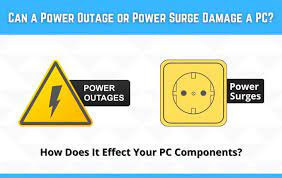Yes, power outages can potentially damage a PC. When a power outage occurs, it can lead to abrupt power loss, which can have several adverse effects on a computer's hardware and data. Here are some ways a power outage can damage a PC:
Power Surge: Sometimes, when the power is restored after an outage, it can come back with a surge or spike in voltage. This sudden increase in voltage can overload the components of a computer and cause damage to the power supply, motherboard, or other internal parts.
Power Fluctuations: Power outages can also result in power fluctuations or inconsistent voltage supply. These fluctuations can cause instability in the PC's components, leading to hardware failures over time. Components such as the CPU, RAM, or hard drives can be affected by these voltage variations.
File System Corruption: If a computer is in the middle of a critical process, such as writing data to the hard drive, and a power outage occurs, it can result in file system corruption. This can lead to data loss or damage to the storage drive, making it difficult to access or retrieve files.
Booting Issues: Power outages can interrupt the booting process, preventing the PC from starting up correctly. In some cases, it may cause the operating system or BIOS to become corrupted, leading to booting problems or even rendering the computer inoperable.
How to protect against power loss on PC.
To protect your PC from potential damage during a power outage, it is advisable to use an uninterruptible power supply (UPS). A UPS acts as a backup power source and provides a limited amount of power to your computer, allowing you to safely shut it down during a power outage. Additionally, surge protectors can help guard against power surges that may occur when the power is restored.

